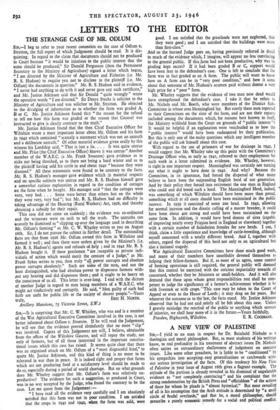SIR,—It is surprising that Mr. C. W. Whatley, who was
and is a member of the War Agricultural Executive Committee involved in the case, is not better informed about Odium v. Stratton. If he will read the Judgement, he will see that the evidence proved abundantly that no mere " slip " was involved. Copies of this Judgement are still, I believe, obtainable from the offices of the Wiltshire Gazette, and will repay the study, not only of farmers, but of all those interested in the important constitu- tional issues which this case has raised. It seems quite clear that there was an organised attack on Mr. Odium of a " most disgraceful kind," to quote Mr. Justice Atkinson, and this kind of thing is no more to be tolerated in war than in peace. It is indeed right and proper that farms which are not producing food at a satisfactory level should be made to do so, especially during a period of world shortage. But on what grounds does Mr. Whatley suggest that Mr. Odium's farm was relatively un- productive? The evidence for such a suggestion, as produced in Court, was in no way accepted by the Judge, who found the contrary to be the case. Let me quote from the Judgement:- " I have read all the evidence very carefully and I am absolutely satisfied that this farm was not in poor condition. I am satisfied that the crops in 1941 and 1942, when the farm was sold, were good. I am satisfied that the grasslands were not neglected, that they were good ; and I am satisfied that the buildings were more than first-class."
And so the learned judge goes on, having previously referred in detail to much of the evidence which, I imagine, will appear no less 'convincing to the general public. If this farm had not been productive, why was its grading kept secret? If it had been graded B or C, support would have been lent to the defendant's case. One is left to conclude that the farm was in fact graded as an A farm. The public will want to know how an A farm can be in " very poor condition," and how it came about that someone of Mr. Hudson's acumen paid without demur a very high price for a " poor " farm.
Mr. Whatley suggests that the evidence of two men now dead would have strengthened the defendant's case. I take it that he refers to Mr. Nichols and Mr. Booth, who were members of the District Sub- Committee in whose area Manningford lay. But surely these men reported to their Committees on the state of the farm, and are not their reports included among the documents which, for reasons best known to itself, the Ministry withheld from the Court on grounds of " public interest"? It would be helpful if an explanation were vouchsafed as to how the " public interest " would have been endangered by their publication. But this is only one of the many questions which any intelligent member of the public will ask himself about this case.
With regard to the use of prisoners of war for drainage in 1942, I would suggest that Mr. Whatley take up this point with the Committee's Drainage Officer who, as early as 1941, referred to their employment for such work in a letter submitted in evidence. Mr. Whatley, however, is right in one important respect. Manningford was certainly not turning out what it ought to have done in 1942. And why? Because the Committee, in its ignorance, had forced the dispersal of what many believe to have been the outstanding English herd of our generation. And by their policy they forced into retirement the one man in England who could and did breed such a herd. The Manningford Herd, indeed, was something of which Wiltshire should have been more than proud, something which at all costs should have been maintained in the public interest. In 1939 it consisted of some zoo head. In 1942, allowing for normal increase and the drastic culling of a master breeder, it could have been about 400 strong and could have been maintained on the same farm. In addition, it would have bred dozens of sires (capable of improving nearly every Friesian herd in England or elsewhere) together with a certain number of foundation females for new herds. I can, I think, claim a little experience and knowledge of cattle-breeding, although myself concerned with a totally different breed. And I, together with others, regard the dispersal Of this herd not only as an agricultural but also a national tragedy.
War Agricultural Executive Committees have done much good work, and many of their members have unselfishly devoted themselves to helping their fellow-farmers. But if, as most of us agree, some control of farming operations is still required, the general public will demand that this control be exercised with the strictest impartiality towards all concerned, whether they be Ministers or small-holders. And it will also demand that those upon whom great responsibilities rest shall be com- petent to judge the significance of a farmer's achievement whether it be with livestock or with crops. This case may be taken to the Court of Appeal or even to the House of Lords ; it may drag on for years. But whatever the outcome as to the law, the facts stand. Mr. Justice Atkinson observed that he had not said nearly all he felt about this case. Unless I gravely misjudge the reaction of the public to anything which savours of injustice, we shall hear more of it in the future.—Yours faithfully,


























 Previous page
Previous page